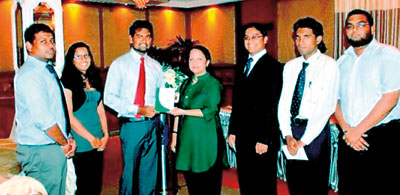Their green vision
Youth activism in Sri Lanka is at an all-time high. Challenging society’s version of the norm, young people are vocal about issues that affect them and their future. When the Ministry of Environment requested youth-oriented environmental group Youth for a Greener Sri Lanka to submit a Youth Position Paper for the Country Report to be presented by President Mahinda Rajapaksa at Rio+20, the dynamic six-member team that drafted the position paper after consultations among diverse youth groups came up with some ambitious suggestions.

Some members of the team that drafted the Youth Position Paper
The committee was chaired by Neshan Gunasekara and comprised Maleen Jayasuriya (representing Sri Lanka Model United Nations), Kanchana Weerakoon (ECO-Volunteers), Sudarsha De Silva (Earth Lanka Network), Gayani Hewawasam (Training for Trusteeship), and Varuna Poonamperuma (Connect Lanka). They were assisted by Laksheta Moorjani, Taamara De Silva, Sikander Sabeer, Sahan Hattotuwa, Rehan Fernando, Senel Wanniarachchi, and Kaveesh Gunasekara.
The suggestions for a greener Sri Lanka included in the document are far-reaching for a country still on the perimeters of a green economy, but it is exactly what the authors believe Sri Lanka needs. “This paper is a testament to how strongly youth feel about conserving the environment and how important it is for us to take leadership and galvanize that very process,” says Maleen Jayasuriya.
Youth for a Greener Sri Lanka (YGSL) brings together over 30 youth-led environmental organizations, businesses and other stakeholders to one platform where they could collectively meet to discuss initiatives, share ideas and partner on projects. Under the patronage of the United Nations Development Programme and UN Volunteers, they’ve been instrumental in facilitating dialogue and partnerships between youth-led green organizations that would’ve otherwise worked in isolation.
Neshan Gunasekara believes that this interlinking facility is the most important feature of an organization like YGSL. “Sri Lanka has a very high number of youth activists, but the problem is that they work in isolation.” This is the reason behind the lack of long-term sustainability of such organizations and ineffectiveness of initiatives taken by such groups, he feels.
The youth position paper was presented to the Minister of Environment and Natural Resources and other officials on June 8. The special subcommittee with Neshan as Chairperson had worked on the document from early April of this year. The initiative had the support of the UNDP, National Youth Services Council, International Labour Organization and UN Fund for Population,
(The complete document can be found on www.ygsl.lk)
The document was included in Sri Lanka’s Country Report submitted to the UN at the Rio+20 Conference on Sustainable Development held last week in Rio de Janeiro. Speaking on the importance of such a conference to a country like Sri Lanka, Country Director of the UNDP Douglas Keh emphasized the opportunity to make maximum use of recent developments to emerge as a role model for sustainability. “As a country on the verge of massive scale development, Sri Lanka has a rare and very precious opportunity to ensure their future policies are aligned with sustainability. Sri Lanka can leapfrog all the environmentally unfriendly practices prevalent in other countries and become a role model and trendsetter for sustainable development.”
He was very optimistic and ‘very much impressed’ on the position paper drafted by the young activists. The recommendations are reasonable, if ambitious, and I can tell that the hearts and minds behind this were in the right place. The position paper is not only timely and relevant, but it is well-played in convincing policy makers to take on their suggestions.
The National Youth Services Council, the national youth representative body, a major stakeholder of YGSL was instrumental in facilitating YGSL’s involvement with Rio+20. “The existence of such capacity among the youth of Sri Lanka strengthens the case for Sri Lanka to host the Global Youth Conference in 2014,” said NYSC Chairman Lalith Piyum Perera. Sri Lanka is bidding to host the conference, which will bring together a large number of young activists from around the world.
Recommendations included in the official Sri Lanka Youth Position Paper
- Participation for youth at all levels of the decision making process
- Employment opportunities for youth that include green jobs: bridging the skills gap of youth through education and training and promotion of social entrepreneurship.
- An office for an Ombudsperson/High Commission for future generations in the Parliament of Sri Lanka in order to provide necessary input into national level policies
It also calls upon the political leadership of Sri Lanka to commit to:
- Promote and support reforestation projects
- Sustainable water resource management
- 20% of youth to be employed in the marine sector by 2022 (taking into consideration the country’s great marine resource base and diverse employment opportunities available in that sector)
- Effective implementation of major laws that address marine issues in Sri Lanka
- Maintain and improve air quality (suggestions include certified emission credit certification systems)
- Harness renewable resources as an alternative for fossil fuel power generation
- Invest further in upgrading the public transportation systems to combat traffic congestion and carbon emission
- All development plans to take into consideration procedures such as green accounting




















